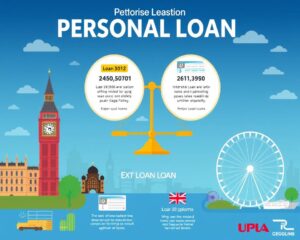Did you know that about 60% of personal loans in the UK are unsecured? This shows how popular unsecured personal loans are in England. They offer a flexible way to get money without risking your assets.
These loans are great for many needs, like paying off debts, improving your home, or dealing with sudden costs. Here, you’ll learn about unsecured loans in England and how to apply for them.
Understanding Unsecured Loans
Unsecured loans are a financial option many consider for different needs. Knowing what they are can help you decide if they’re right for you. This section explains what unsecured loans are and their main features. It aims to give you a clear view of this lending option.
Definition of Unsecured Loans
Unsecured loans mean you can borrow money without putting up collateral. Lenders look at your credit and financial situation to decide if you can repay. This makes it easier for those without valuable assets to get a loan.
Key Features of Unsecured Loans
It’s important to know the main features of unsecured loans before you apply. Key features include:
- Loan Amounts: You can get a fixed or variable amount based on your eligibility.
- Repayment Terms: These loans often have fixed terms, making it easier to budget.
- No Collateral Required: You can get funds without using your assets as security.
This flexibility makes unsecured loans a good choice for many financial needs, from personal expenses to business investments.
| Feature | Description |
|---|---|
| Loan Amount | Varies by lender and borrower credit profile |
| Interest Rates | Generally higher than secured loans due to risk |
| Repayment Terms | Set time frame for full payment, often ranging from one to seven years |
| Access to Funds | Quick approval and disbursement, ideal for urgent needs |
This overview of unsecured loans can help you understand their benefits for your financial situation.
Advantages of Choosing Unsecured Loans
Unsecured loans have many benefits that make them popular. A big plus is that you don’t need to put up collateral. This means you can borrow money without risking your valuable items, like your home or car.
Freedom from Collateral
Choosing an unsecured loan means you don’t have to use your assets as collateral. This makes borrowing easier and safer for you. If money problems come up, your assets stay safe, helping you get through tough times.
Flexible Usage of Funds
Unsecured loans also offer flexibility in how you use the money. You can use it for emergencies, home improvements, or to pay off debt. This freedom is great for tackling urgent financial needs or starting important projects.
Disadvantages of Unsecured Loans
Unsecured loans offer flexibility, but they also have downsides. It’s important to know these before you decide. This way, you can make a smart choice about your money.
Higher Interest Rates
One big problem with unsecured loans is their interest rates. These rates are often higher than those for secured loans. This means you’ll pay more over time, affecting your budget.
Also, your credit score can influence the rates you get. If your score is low, lenders might charge you even more. This can make borrowing more expensive.
Impact on Credit Score
How well you manage an unsecured loan can hurt or help your credit score. Missing payments can lower your score, making it hard to get loans later. It’s crucial to stay on top of payments to avoid this.
Any financial mistake can harm your credit for a long time. This can limit your options for future financing.

Eligibility Criteria for Unsecured Loans in England
Understanding what you need to get an unsecured loan is key. In England, lenders have certain rules to see if you’re a good fit for a personal loan. If you meet these, you might get your loan approved faster and with less hassle.
Age and Residency Requirements
To get an unsecured loan in England, you must be 18 or older. You also need to live in the UK. These basic rules help lenders decide if you’re right for a loan.
Income and Employment Considerations
Having a steady job and income is important for loan eligibility. Lenders want to see proof of your income. This could be from a full-time job, part-time work, or being self-employed. They need to know you can pay back the loan.
| Criteria | Description |
|---|---|
| Age | Must be at least 18 years old |
| Residency | Resident of the United Kingdom |
| Income | Proof of stable income required |
| Employment | Consistent and verifiable employment status |
How to Apply for an Unsecured Loan in England
Applying for unsecured loans can seem tough, but knowing the steps makes it easier. First, you should look into different lenders and loan types. Each lender has its own terms, rates, and repayment plans. It’s important to compare these to find a loan that fits your needs.
Researching Lenders and Loan Options
When searching for lenders, consider both banks and online lenders. Each has its own offers, so comparing them is key. Look at:
- Interest rates
- Loan terms
- Fees and penalties
- Customer reviews
Learning about different lenders helps you make smart choices. This ensures your loan application matches your financial goals.
Gathering Required Documentation
After picking a lender, focus on getting the needed documents. Common requirements include:
- Proof of identity, such as a passport or driver’s license
- Proof of income, including payslips or bank statements
- Proof of residency, like utility bills or tenancy agreements
Having all documents ready makes the application smoother. This preparation helps you move forward with your application.
Comparing Unsecured Personal Loans England
Exploring unsecured personal loans in England requires understanding key factors. It’s important to compare interest rates and loan terms from different lenders. This helps you find the best option for your needs.
Understanding Interest Rates and APR
Interest rates for unsecured personal loans in England vary a lot. This affects how much you’ll pay over the loan’s life. The APR includes interest and fees, showing the total borrowing cost. Comparing these rates can save you money in the long run.
Evaluating Loan Terms and Conditions
Comparing loan terms is key to making a smart choice. Look at repayment schedules, early repayment fees, and late payment penalties. Knowing these details helps you see if the loan fits your budget. It’s not just about the lowest rate, but also if you can afford it.

By considering both interest rates and loan terms, you can pick a loan that fits your finances. This approach helps you avoid extra costs and secure a better financial future.
Tips for a Successful Loan Application
Getting an unsecured loan needs good planning and strategy. Follow these tips to boost your chances of a successful loan application. Start by improving your credit score and looking at your overall finances.
Improving Your Credit Score Before Applying
Before you apply for a loan, make sure your credit score is good. Pay off debts and fix any payment issues. Check your credit report often to find and fix errors.
These steps will help you look better to lenders.
Presenting a Solid Financial Profile
Having a strong financial story is key. Show your income, debt, and budget clearly. This shows you’re responsible and can handle repayments.
A good financial profile makes your loan application more attractive.
Choosing the Right Loan Amount
Choosing the right loan amount is important. Pick an amount that fits your needs but doesn’t strain your finances. Avoid taking on too much debt.
Choosing wisely shows lenders you’re serious about keeping your finances healthy.
Common Uses for Unsecured Loans
Unsecured loans are flexible and popular for many financial needs. Knowing how to use them can help you make smart money choices.
Debt Consolidation
Debt consolidation is a big reason people get unsecured loans. Managing many high-interest debts can be tough. A consolidation loan can merge these debts into one with a lower rate.
This makes paying off your debt easier and can save you money. It’s a way to simplify your finances.
Home Improvements and Renovations
Need to improve your home? Unsecured loans can help with that. They’re great for updating your kitchen, fixing up the bathroom, or adding a new room.
These loans don’t require collateral, giving you more freedom. They can make your home more comfortable and even increase its value.
| Use of Unsecured Loans | Description | Benefits |
|---|---|---|
| Debt Consolidation | Combining multiple debts into one loan | Simplifies payments, potentially reduces interest |
| Home Improvements | Funding for renovations and upgrades | Increases home value, enhances living experience |
Conclusion
Unsecured loans are a flexible way to get funds without needing collateral. You’ve learned about their unique features, like being easy to get and useful for many things. But, remember, they might have higher interest rates and affect your credit score.
Thinking about personal loans? It’s key to do your homework. Find the right lender and understand the application process. Knowing your financial situation and what you can borrow helps make a smart choice.
This summary on unsecured loans stresses the need to be ready. Having all your documents in order and showing a strong financial picture can help. Making informed choices will help you confidently deal with unsecured loans.



